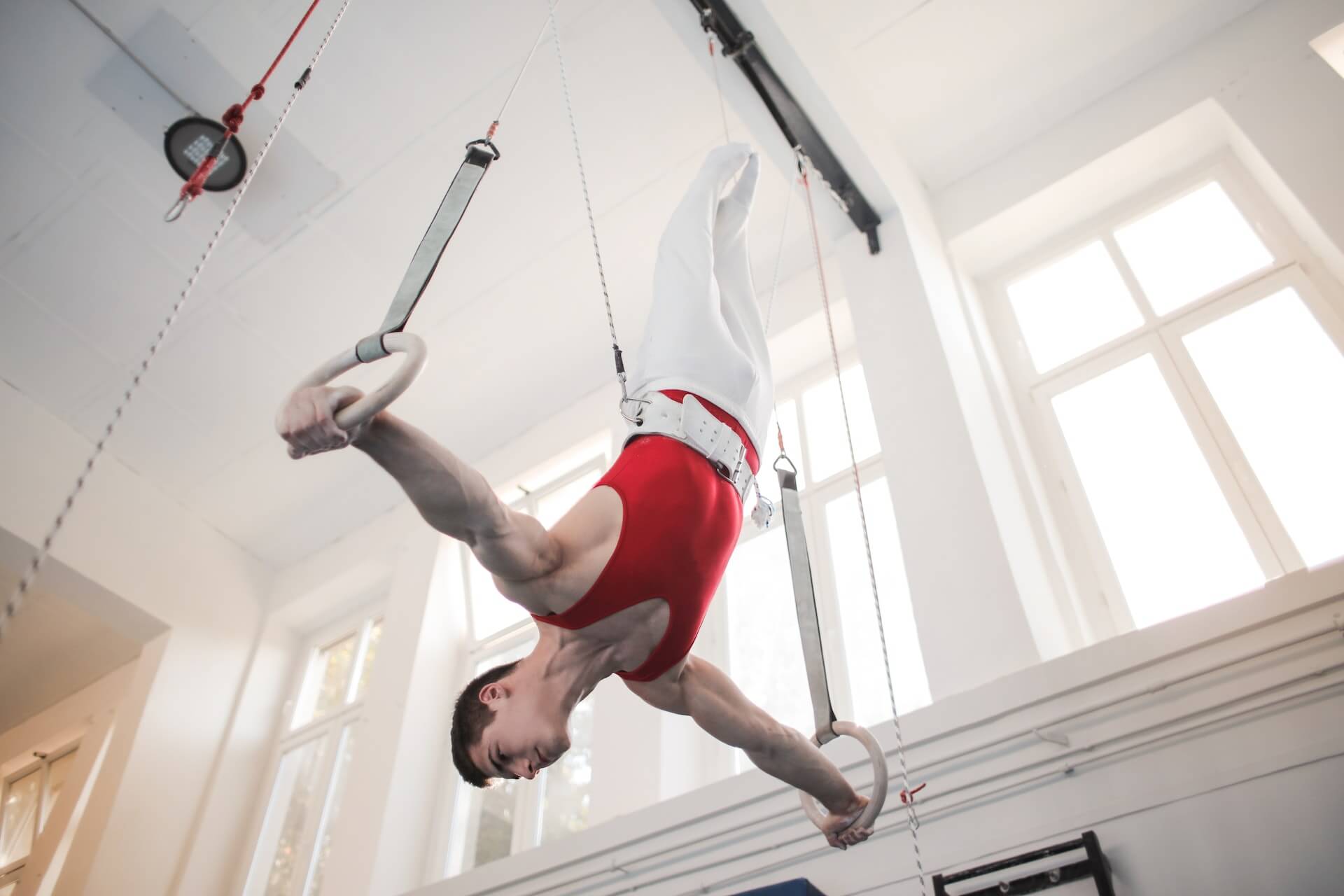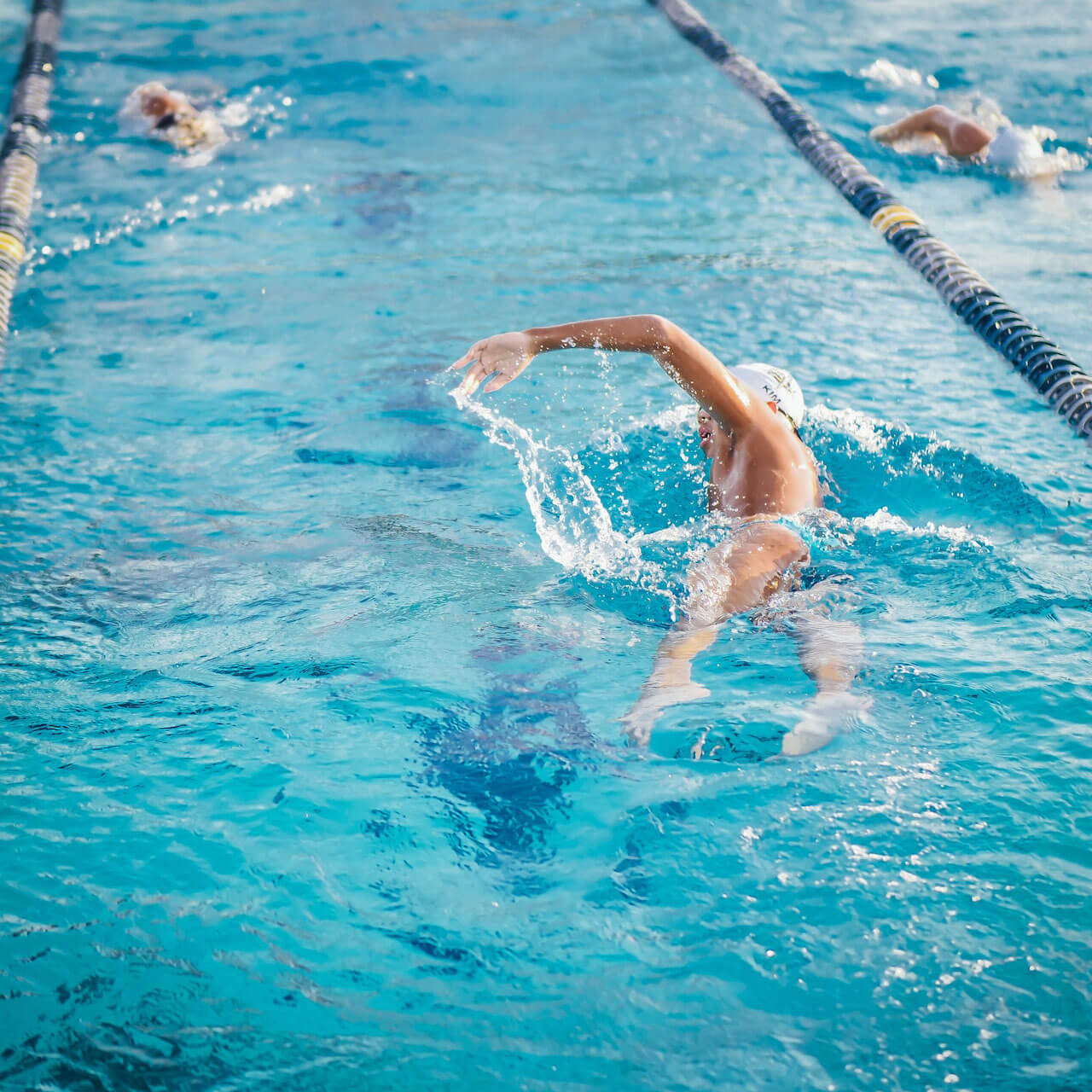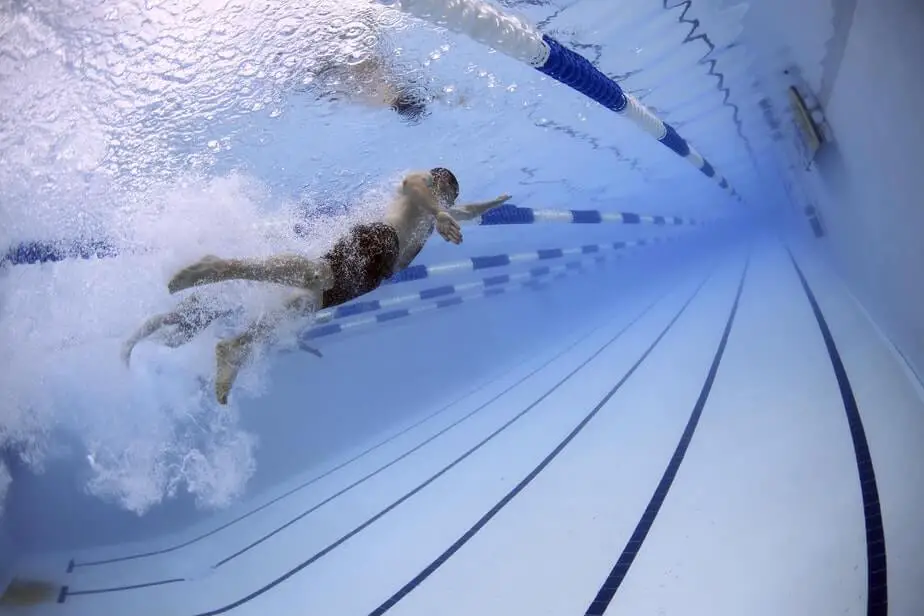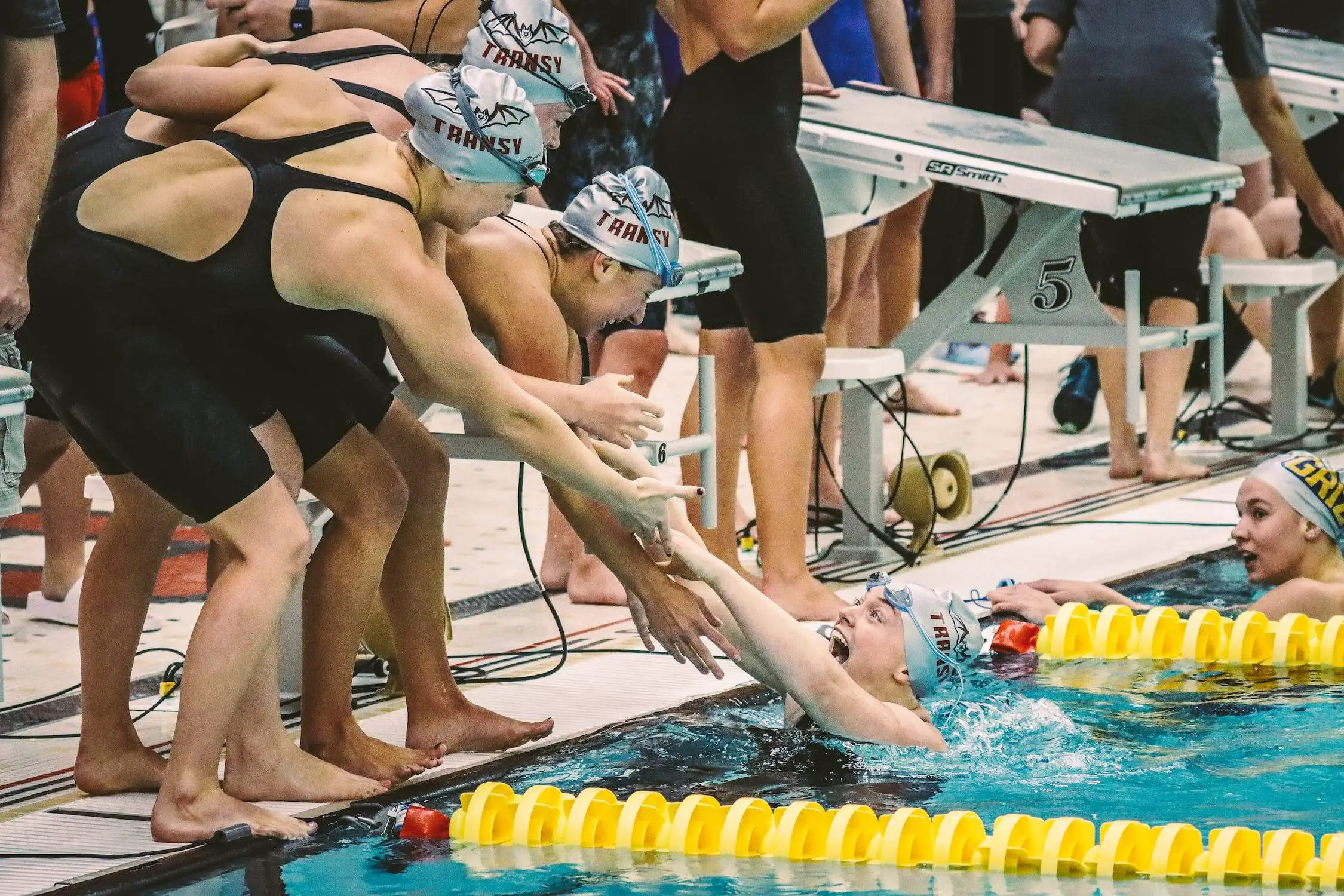You don’t often compare swimming and gymnastics, but here we are. These two sports require incredible amounts of strength, flexibility, and skill, making them an interesting, albeit niche topic of debate when determining which is more difficult.

Swimming requires exceptional cardiovascular fitness and mastery over a range of technical skills, such as the four swimming strokes. Gymnastics hinges on precise control of your body, incorporating elements like balance, coordination, and flexibility to execute complex routines on various apparatuses. Both sports have their difficulties, but gymnastics is just as technical but significantly more dangerous, making it harder.
In this article, we’ll explore the different aspects that contribute to the difficulty of swimming and gymnastics, helping you better understand the challenges that athletes face in these disciplines.
Swimming vs. Gymnastics
Swimming: Speed and Power
Swimming is all about propelling yourself through water as quickly and efficiently as possible. This sport focuses on speed and power, as well as cardiovascular endurance and stamina.
You need to have strong muscles to create the necessary force to move through water, especially considering its resistance. Swimming demands exceptional lung capacity and efficient breathing techniques to maintain optimal oxygen levels during the intense workouts.
Moreover, swimming involves a variety of strokes, like freestyle, backstroke, butterfly, and breaststroke. Each stroke demands a unique blend of power, technique, and mental concentration. Learning the correct techniques for each stroke and maintaining streamlined form is critical to maximizing your speed and conserving your energy for those lengthy races.
Gymnastics: Skill and Control
Gymnastics, on the other hand, emphasizes skill and control. This sport requires an immense amount of strength, balance, and flexibility, as you perform intricate and strenuous moves on various apparatuses. Gymnasts showcase their athleticism and artistry in floor exercises, balance beam, uneven bars, vault, and more.
Precision is the key in gymnastics – every hand placement, foot position, and body alignment must be exact for each move. It also tests your mental fortitude, as you must maintain a high level of focus while performing complex routines under the pressure of competition.
Additionally, gymnastics demands extraordinary body awareness and spatial understanding, which require countless hours of practice and repetition to perfect.
Training and Practice
Swimming Training Regime
When it comes to swimming, your training and practice involve a combination of different aspects. First, you need to work on your technique and form to ensure efficient and smooth movements through the water. You’ll want to dedicate significant time in the pool, working on various strokes such as freestyle, backstroke, breaststroke, and butterfly.
In addition to swimming technique, swimmers undergo a rigorous conditioning routine. This includes strength and endurance training, both in and out of the water.
You can expect to spend time in the gym, working on your core, leg, and upper body strength, as well as doing cardio exercises like running or cycling. A coach is fundamental in creating a personalized training plan that meets a swimmer’s specific needs and goals.
Gymnastics Training Regime
Gymnastics training is also demanding, requiring immense strength, flexibility, and precision. Your practice sessions will be guided by your coach, who helps you in developing the complex skills needed in various events such as floor, vault, uneven bars (for women), and rings (for men).
Strength and conditioning are crucial in gymnastics. You’ll likely spend hours working on your core, leg, and upper body strength through bodyweight exercises, resistance training, and targeted workouts. Flexibility also plays an essential role in gymnastics, so be prepared to engage in some extensive stretching routines and activities like yoga or Pilates.
Moreover, mastering gymnastics stunts and routines requires numerous hours of practice to perfect each element. Balance, body awareness, and mental focus are all critical factors of success in this sport, and you’ll need to put in a lot of hard work and dedication to achieve proficiency.
Physical Demands and Fitness
Demands of Swimming

Swimming is a whole-body exercise that requires a high level of cardiovascular fitness, strength, and endurance. When you’re in the water, you have to propel yourself using your arms and legs, engaging every major muscle group.
To maintain an efficient swimming technique, you need to have good balance and body awareness. Proper breath control is also crucial, as it affects your buoyancy and speed.
In addition to overall strength, swimming demands precise movement patterns and hand-eye coordination. With various strokes like freestyle, breaststroke, backstroke, and butterfly, you’ll need to master different techniques and maintain a good rhythm. Furthermore, swimming enhances your agility and flexibility as your body moves through the water.
Demands of Gymnastics
Gymnastics, on the other hand, focuses more on power, balance, and flexibility. As a gymnast, you’ll perform a series of acrobatic movements that require you to control your body in various positions, both on the ground and in the air. These skills necessitate strong core muscles, muscular endurance, and excellent body awareness.
Gymnastics routines often involve intricate flips, jumps, and balances, which means you’ll have to develop an exceptional sense of hand-eye coordination. Additionally, the fast and powerful movements in gymnastics call for high levels of agility and quick reflexes.
Another essential aspect of gymnastics is mental focus. During a routine, you have to concentrate on executing each movement flawlessly while maintaining the correct body position and alignment. This kind of focus is vital for performing complex moves and avoiding injuries.
Mental Strength and Focus
Mental Toughness in Swimming
Swimming requires a significant amount of mental strength and focus. As a swimmer, you need to overcome various fears and pressures to achieve success.
You might face the fear of deep water, worry about drowning, or struggle with the anxiety of competing against other athletes. Swimming also requires consistent practice, concentration on technique, and the ability to make quick adjustments during races.
Mental Toughness in Gymnastics
Gymnastics is another sport that demands strong mental focus and mental toughness. As a gymnast, you must face the fear of injury and perform under high-pressure situations, such as intense competition or the scrutiny of judges.
The precise and complex nature of gymnastics movements requires extreme concentration, making it essential for gymnasts to focus on their techniques and maintain their composure during routines.
Injuries and Risks
Swimming Injuries and Risks
Swimming is often viewed as a low-impact sport, but it’s not without its risks. Poor stroke mechanics or decreased flexibility and strength may lead to overuse injuries.
Common swimming injuries include:
- Shoulder pain: Often caused by overuse or poor technique, leading to inflammation or rotator cuff issues.
- Knee pain: Frequently experienced by breaststroke swimmers due to the repetitive, forceful motions involved in the kick.
- Lower back pain: Usually results from improper core engagement or body alignment during backstroke or butterfly.
Gymnastics Injuries and Risks
Gymnastics has some of the highest injury rates in sports, making injury prevention crucial. Injuries in gymnastics often occur during competitions rather than practice sessions and are more frequent in competitive gymnastics compared to recreational gymnastics.
Common gymnastics injuries include:
- Ankle sprains: Often caused by landing awkwardly after jumps, flips, or dismounts.
- Knee injuries: Usually due to excessive strain during jumps or landings, leading to ligament damage.
- Wrist sprains: Result from repetitive stress and excessive weight-bearing on the wrist during handstands, vaulting, or tumbling.
Technique and Execution
Swimming Technique

When it comes to swimming, technique is crucial. Your ability in the water is largely determined by how efficiently you can move. To do this, you must master several aspects of the sport.
First, work on your precision. The way you position your body, hands, and feet has a considerable impact on your performance. Streamlining your body reduces drag and enhances your speed.
Another essential component is your underwater skills. Efficient kicks and pulls are key to maintaining momentum during each stroke. Work on your explosiveness to push off the walls and transitions effectively.
Lastly, practice your breathing to ensure you are getting enough oxygen while also maintaining your form. Rhythmic and well-timed breaths can make a significant difference in your overall performance.
Gymnastics Technique
For gymnastics, the technique plays an equally important role, requiring athletes to develop a diverse set of skills.
Balance and strength are essential when executing various maneuvers, such as handstands, flips, and dismounts. Proper footwork helps gymnasts maintain their composure as they transition between movements.
Explosiveness is another critical aspect of gymnastics. The ability to generate momentum and power through quick bursts of energy allows gymnasts to perform complex skills like somersaults and aerial acrobatics.
Additionally, gymnasts need impeccable precision as they perform these moves. Even the slightest miscalculation can result in off-center landings or missed hand placements, negatively impacting the overall execution and performance.
Competition and Achievements
Swimming Competitions and Olympic Success

In swimming competitions, you’ll encounter a variety of events requiring different skills and techniques. You can compete individually or as part of a team in events such as freestyle, backstroke, breaststroke, and butterfly. Participating in those events demands exceptional cardiovascular fitness, strength, and flexibility to be successful in this physically demanding sport.
At the Olympic level, swimming achievements rely on the athletes’ age, training, and level of commitment. Typically, swimmers peak in their early 20s, and many remarkable swimmers even break world records before they reach this age.
Moreover, countries with a strong swimming tradition, such as the United States and Australia, tend to excel in the Olympics. A high number of races per year can also contribute to performance improvements and achievements.
Gymnastics Competitions and Olympic Success
Gymnastics is another sport with varied competitions, ranging from individual events, such as floor exercise, balance beam, and uneven bars, to team events. Each discipline requires a combination of physical, technical, and mental strength. Gymnasts typically start training at a young age and dedicate countless hours to perfect their skills and routines.
When it comes to Olympic achievements, gymnastics is known for its intense competition and awe-inspiring performances. Many gymnasts reach their peak performance during their teenage years or early 20s, with some of the most decorated Olympic gymnasts being as young as 16.
The level of mastery, discipline, and sheer athleticism demonstrated by these athletes is a testament to the demanding nature of both training and competition in gymnastics.
The Verdict
It’s clear when comparing these two sports, that regardless of which one is harder, both are difficult in their own ways. With that said, when factoring in the physical, technical, mental strength needed to compete in both gymnastics and swimming at both a casual and professional level, gymnastics is clearly the harder sport.
It is in every way demanding, but on top of that, its risk of injury is much higher, and the injuries are much more severe than swimming. Even if swimming is tough, at least swimmers make it to the end of their careers intact, whereas the same might not be true for gymnasts. One bad fall and they may never walk properly again, if ever.
Even though the dangerousness of an activity doesn’t necessarily make it harder, as mentioned, gymnastics are every bit as technical and physically demanding as swimming. So, all other factors being equal, the risk that gymnasts put themselves through to put on a good show has earned them the right to claim their sport is harder than swimming.
Frequently Asked Questions
Is gymnastics more physically demanding than swimming?
Gymnastics and swimming both require a high level of physical strength, flexibility, and skill. Gymnasts need to have great balance, coordination, and body control for performing gravity-defying moves, while swimmers face the challenges of water resistance and maintaining proper technique throughout their races. However, gymnastics is much more dangerous and injury-prone, the physical demands are certainly high.
Which sport requires higher endurance, swimming or gymnastics?
Both sports require exceptional levels of endurance. Swimmers need strong cardiovascular fitness to push through the drag and resistance of water, while gymnasts require muscular strength to hold challenging poses and perform complex routines. However, swimming may put more emphasis on consistent endurance due to the longer duration of races, while gymnastics places a higher focus on short bursts of intense energy.
What challenges do swimmers face compared to gymnasts?
Swimmers must deal with the unique challenge of water resistance, which is much greater than air. This element makes swimming more demanding on muscles and requires precise technique to reduce drag. Swimmers also need to develop a strong breath control to maintain an efficient oxygen supply during races. In contrast, gymnasts face the challenges of performing acrobatic moves that defy gravity, requiring exceptional balance, body control, and strength.
Which sport has a steeper learning curve, gymnastics or swimming?
Gymnastics may seem harder at first due to the level of body control and balance needed for even basic moves. However, swimming also has a steep learning curve as mastering the proper techniques to overcome water resistance takes time and effort. The learning curve for each sport depends largely on your individual strengths and abilities.
How do gymnastics and swimming differ in terms of mental discipline?
Gymnasts often need to overcome fear when performing dangerous moves, while also maintaining intense concentration to execute their routines flawlessly. Swimmers, on the other hand, must develop a strong mind-body connection to maintain proper technique and strategy throughout long races. While both sports demand mental strength, the specific challenges faced by athletes in each sport can differ.
Sources:
- https://www.upmc.com/Services/sports-medicine/for-athletes/swimming
- https://pubmed.ncbi.nlm.nih.gov/30670379/
- https://pubmed.ncbi.nlm.nih.gov/30407945/
- https://www.insider.com/the-3-hardest-olympic-sports-according-to-experts-2021-7/
- https://www.frontiersin.org/articles/10.3389/fspor.2020.589938/full

